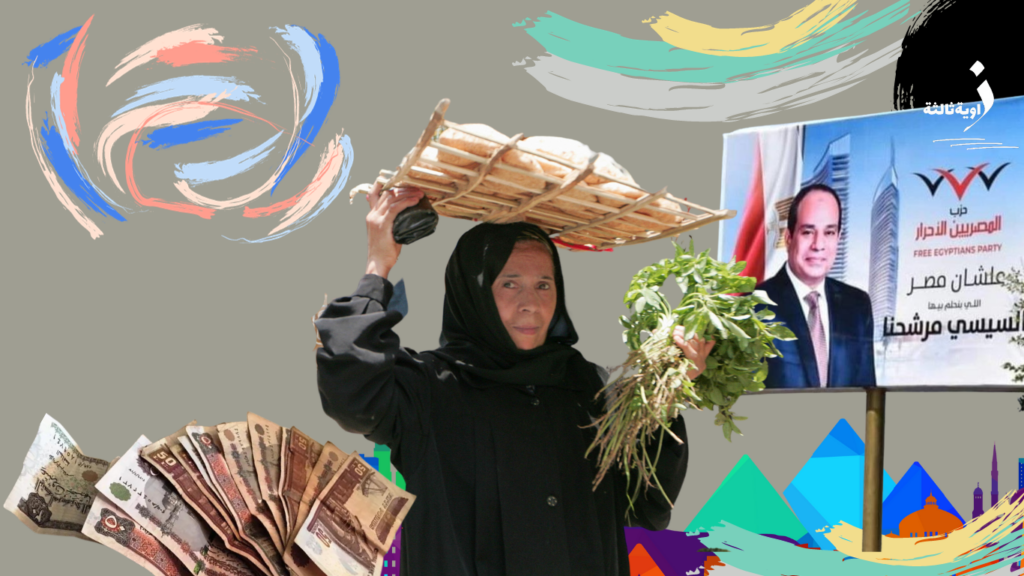Egypt is facing significant economic challenges following a severe shortage of hard currency, leading to multiple devaluations of the Egyptian Pound last year. This has resulted in a surge in inflation to unprecedented levels in the country.
Since November 2016, the value of the Egyptian currency has been devalued four times. The first devaluation occurred in November 2016, when the exchange rate jumped from 8 Egyptian pounds per US dollar to 19 pounds, later stabilizing at around 16 pounds. The second devaluation took place in March 2022, after the war in Ukraine, lowering the pound from around 16 pounds against the dollar to 18 pounds. The third devaluation occurred in October of last year, with the adoption of a flexible exchange rate for the pound, reaching between 22 to 24 pounds per dollar. In the first month of the current year, the value of the Egyptian currency was reduced to an official rate of around 30.5 Egyptian pounds against the US dollar.
However, the rate offered in banks is not recognized by Egyptian banks themselves. They refuse to meet the demands of those wishing to buy dollars, claiming a lack of foreign currency availability. As a result, those seeking to buy dollars turn to the black market, where the dollar reached a price of 51.25 pounds in the latest transactions on Friday, according to the “Bkam in the Black Market” application, which provides continuous updates on hard currency prices in the parallel (unofficial) market.
The Black Market
Despite its illegality, everyone acknowledges the parallel black market alongside the official market. Egyptian newspapers daily publish the prices of the dollar in the black market as if it were a normal occurrence. Applications used by traders or customers to check dollar prices in the black market are widespread, in addition to private groups on Facebook and Telegram for those interested in buying or selling. There, one can also find special offers.
Article 233 of the Banking Law for the year 2020 stipulates a punishment of imprisonment for a period of no less than 3 years and no more than 10 years, with a fine of no less than one million pounds and not exceeding five million pounds, or the financial amount involved in the crime, whichever is greater. This applies to anyone dealing in foreign currency outside authorized banks or licensed entities, such as exchange companies. In all cases, the amounts and items subject to the claim are confiscated, and if not seized, an additional fine equal to its value is imposed.
But do Egyptians care about the illegality of the black market?
” The black market controls prices, and I won’t sell a gram of gold at the bank’s rate. Are we fooling each other?” says George, a goldsmith who believes that adopting the official dollar rate in banks will result in a financial loss of more than 35%, according to his estimates.
An activist in the black market working in a currency exchange in Alexandria tells Zawia3 that trading in currency is “a lawful living.” He adds that they help students who want to study abroad and cannot find hard currency or travelers for treatment, work, or tourism. However, he believes that real gains come from merchants who want to pay for their goods at higher prices. He adds, “The situation doesn’t stop; there will always be someone who wants to convert the pound into dollars to preserve its value, turning to the black market.”
Ahmed Fayez, a young businessman who describes himself as owning a small importing company from different countries, always deals in dollars. His company imports packaging, wrapping, furniture, and agricultural equipment. He believes he cannot work without providing dollars, resorting to the black market. Fayez adds that it is the government’s responsibility to provide currency in banks if it wants the black market to stop.
Since the first quarter of the current year, dollar activity in the black market has returned, involving some gold shops and individuals working in exchange companies and other activities outside company premises, despite the severe penalties imposed by the law on trading in foreign currencies.
Decline in Egyptians’ Overseas Remittances
Many Egyptians have chosen the unofficial route to transfer their money to Egypt, resulting in a significant decrease in the official figures for Egyptians’ overseas remittances, a major source of foreign currency in Egypt.
The remittances of Egyptians working abroad during the fiscal year 2022-2023 dropped by 30.8% on an annual basis, according to official data.
Central Bank of Egypt data on the economy’s transactions with the external world during the fiscal year 2022-2023 revealed a decline in Egyptians’ remittances from abroad during the previous fiscal year to $22.1 billion, compared to $31.9 billion in the previous fiscal year.
An individual working in Saudi Arabia confirms that he now only sends very small amounts to his family in Egypt through banks when necessary. He prefers to send money through friends who visit Egypt to hand them the funds directly, allowing his family to exchange currency in the black market and receive a fair value.
Anticipated Devaluation of the Egyptian Pound
Estimates from Fitch Solutions suggest a possible increase in remittances from Egyptians abroad during the current fiscal year 2023-2024, reaching up to 10 percent. Fitch bases its projections on the likelihood of a potential devaluation of the Egyptian currency in the near future. Ramona Mubarak, Head of Risk Management for the Middle East at Fitch Solutions, expected the dollar exchange rate to rise to between 40 to 45 pounds during the first quarter of the upcoming year in the official market.
Regarding the impact of the 2023 Gaza war on the economies of the Middle East region, Fitch Solutions stated that Egypt is one of the most affected countries in North Africa due to its borders with Gaza and Israel, in addition to the economic challenges it has been facing since March 2022.
Fitch Solutions noted that “Egypt is currently facing increasing pressures on its external position due to rising external financing needs amid limited capital inflows.” The authorities are expected to overcome these pressures through the International Monetary Fund (IMF) program and financial support from the Gulf Cooperation Council markets. However, Fitch emphasized that “timing is crucial because the limited foreign exchange reserves leave the government with little room for maneuver, prohibiting errors or delays in securing financing.”
Furthermore, Fitch warned that if these risks materialize, it could weaken the currency more than currently anticipated, leading to exacerbated inflationary pressures, increased political risks, and a further slowdown in economic activity.
The most significant risks facing the Egyptian economy in the near term, according to Fitch Solutions, include “the large fiscal deficit, which will take some time to address due to the rising costs of debt servicing. Exhaustion of almost all external financing options makes the country vulnerable to shocks.”
Fitch also highlighted the significant reliance of the industrial sector on imported materials, producing low-value-added goods, meaning that non-hydrocarbon net exports still face challenges. Additionally, high levels of corruption, bureaucracy, and the continued presence of state-affiliated entities and the military in the economy at the expense of the private sector were mentioned as ongoing issues.
Will the Crisis Continue?
Egyptian Prime Minister Mostafa Madbouly stated that the currency crisis the country is experiencing is temporary and will end very soon. Madbouly considered that “the more critical issue is what comes after that,” emphasizing the lesson learned from the global economic crisis that as a country, Egypt must possess its production capabilities as much as possible.
Egypt is required to repay installments and interest on debts totaling $29.229 billion during the coming year, according to the External Position report on the Egyptian economy issued by the Central Bank of Egypt.
In October of the previous year, Egypt agreed on a $3 billion financial support package with the International Monetary Fund (IMF), pledging to transition permanently to a flexible exchange rate. However, this has not been realized yet.
On March 22, the World Bank announced a new strategic partnership with Egypt for the years 2023 to 2027, providing $7 billion in funding. The focus will be on creating more job opportunities in the private sector, supporting the provision of better health and education services, and supporting climate change adaptation measures.
Concerns and Debts
Official data in October revealed that Egypt’s external debt rose to $165.361 billion by the end of the first quarter of the current year, a 1.5% increase or $2.43 billion compared to the fourth quarter of 2022 when it recorded $162.928 billion, according to the Central Bank of Egypt statistics.
Egypt’s external debt increased by $7.56 billion on an annual basis compared to the end of the first quarter of 2022 when the external debt’s value was around $157.801 billion. The same data revealed that the value of external debts due for repayment next year 2024 by the Egyptian government is approximately $29.229 billion.
According to the report on the external situation of the Egyptian economy issued by the Central Bank, this value includes repaying interest of $6.312 billion and debt installments estimated at around $22.917 billion. The report indicates that around $14.595 billion needs to be paid during the first half of 2024, with an expected payment of around $14.634 billion during the second half of the same year.
The external debts due for repayment will decrease to $19.434 billion, divided into about $11.155 billion during the first half of 2025 and approximately $8.28 billion during the second half of the same year.
Fitch had downgraded Egypt’s credit rating for foreign currency issuers to “B-” from “B,” citing increased risks to external financing and tourism due to the ongoing conflict between Hamas and Israel, which may impact the Egyptian tourism sector. The agency stated that “Egypt’s proximity to the conflict between Israel and Hamas and the potential influx of refugees increases security risks, especially in the Sinai region.” It also noted that the expected revenues from tourism, the Suez Canal, and the recovery of remittances from abroad will help contain financing needs due to increased imports.
Fitch stated that “the rating reflects increased risks to Egypt’s external financing, overall economic stability, and the already high government debt path.”
The credit rating agency also revised its outlook for Egypt from “negative” to “stable.”
In October, both Moody’s and Standard & Poor’s credit rating agencies also downgraded Egypt’s credit rating by one notch.












